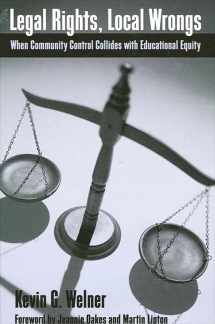
Legal Rights, Local Wrongs: When Community Control Collides With Educational Equity (Suny Series, Restructuring and School Change)
Book details
Summary
Description
Shows how education reforms take place within cauldrons of political interests and conflicting values and beliefs.
Based on an examination of four school districts facing the prospect of court-ordered detracking, Legal Rights, Local Wrongs challenges fundamental assumptions about the opportunities for equity-minded educational reform. Welner studied districts across the country in San Jose, California; Wilmington, Delaware; Woodland Hills, Pennsylvania; and Rockford, Illinois. These case studies show how white upper middle class parents exercised a disproportionate amount of power in local school policy making, and how that power was wielded to hinder reform opportunities intended to benefit low-income students of color. He shows how many school reforms must arise and develop within cauldrons of political interests and conflicting values and beliefs. This reform context is very different from the politically neutral environments presupposed by conventional school change literature. The book’s political and normative focus accordingly examines the least often addressed―and yet most daunting―obstacles standing between America and the just, equitable schools portrayed in American rhetoric.


We would LOVE it if you could help us and other readers by reviewing the book
Book review



